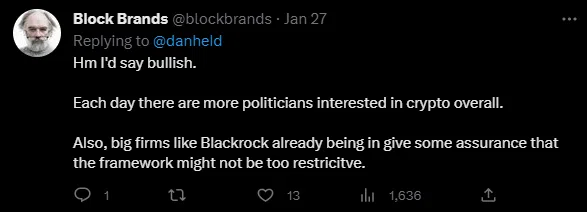On January 27, a new blog appeared on the White House website titled The Administration’s Roadmap to Mitigate Cryptocurrencies’ Risks. In it, four senior officials in U.S. President Joe Biden’s administration described the current problems of the crypto industry and how the U.S. government plans to address them.
This publication is a logical continuation of Joe Biden’s March 2022 mandate to investigate the risks of the cryptocurrency market.
The buidlbee editorial dissects the policy statements to see what these decisions will mean for crypto in general and crypto investors specifically.
The timeframe on how events unfolded
March 2022. Joe Biden instructs the administration to investigate cryptocurrency market risks.
A March 9, 2022, announcement on the White House website states that the “explosive growth” of the crypto industry and the fact that “over 100 countries are exploring Central Bank Digital Currencies” could help the US gain a foothold on the global financial stage, but also means that the government must protect common users.
The brand new newsletter with insights, market analysis and daily opportunities.
Let’s grow together!
Among the main points the administration had to investigate:
- cryptocurrency risks for users;
- crypto market risks to U.S. financial stability;
- the level of illegal activity in the crypto industry;
- current innovations in the marketplace — so that the U.S. could be a leader in delivering these innovations;
- the potential to create an official government-issued crypto version of the dollar.
September 2022. The administration finished its research and released the first framework for crypto-regulation in the U.S.
On the official website, it is called the “First-Ever Comprehensive Framework for Responsible Development of Digital Assets.” Despite the title, there are only general suggestions for what the regulation would look like and in what directions further research is needed.
Among the possible changes:
- the creation of a separate regulator for crypto payments;
- revising Bank Secrecy Act laws, anti-tip-off statutes, and laws against unlicensed money transmitting so that they apply to tokens and NFTs;
- expanding the Department of Justice’s authority to investigate cryptocurrencies;
- the creation of an official government-issued crypto version of the dollar;
- monitoring the capacity and cybersecurity of current stablecoins;
- launching a digital asset research program to develop new crypto products from the U.S. government.
January 2023. Administration issues the “roadmap” to reduce risks of the crypto industry.
We put the term “roadmap” in quotes because, similar to the previous point, the publication is quite general and does not contain the expected stages and dates.
Instead, it highlights Congress’s task for mitigating the risks of the crypto industry:
- control how exchanges use users’ assets;
- oblige crypto companies to disclose information about themselves;
- increase penalties for financial crimes;
- prohibit cryptocurrency intermediaries from passing information to criminals;
- increase funding for law enforcement;
- control the risks of stablecoins.
To be continued…
Most likely, in 2023, we should expect new publications and decrees on crypto regulation. But for now, the only cliffhangers for next season are the newly created National Digital Assets Research and Development Agenda, “to shape a whole-of-government effort on research and development related to digital assets and distributed ledger technology.”
Congress promises to report back “in the coming months” on what exactly will be studied.
Why does the U.S. government need to regulate crypto?
The reasons voiced in the official announcement are to protect crypto investors and the financial systems of the U.S. and the world as a whole, as well as to help America stay on top of the issue.
This is in line with Eloisa Marchesoni, a tokenomics expert who said in the commentary for buidlbee that the FTX collapse and other industry scandals would inevitably lead to more regulation.
Crypto expert and Policy Lead at TRON DAO Andrew Hemingway also argues that the crypto industry is of interest to governments for the same reason as ordinary users: because the traditional financial system has many disadvantages.

Andrew Hemingway, crypto expert and policy lead at TRON DAO
“There is an obvious problem with the fiat banking system and its struggles settling payments. This is true of Swift, Visa, Mastercard, and most government banks. Blockchain-based cryptocurrencies are actively seeking solutions for faster and cheaper transactions,” — said Andrew in his interview for buidlbee.
Crypto regulation: bullish or bearish — the crypto community’s opinion
Bitcoin educator and marketing advisor Dan Held asked this question on Twitter. And judging by users’ comments, mostly everyone is positive — especially in the long term.
Nevertheless, some have spoken negatively, given that the regulation comes from Biden. At the same time, several people believe that it will not affect the market in any way.
But charts tell a different story: just after the President’s March statement, Bitcoin gained 8%.
Now we also see the price of Bitcoin rising.
You have not selected any currency to display
Still, the growth has been observed since the beginning of the year, and since January 27 (the statement date), it has not been as rapid.
More likely, a stronger impact will be seen when the current congressional recommendations turn into actual legislation or specific statements.










